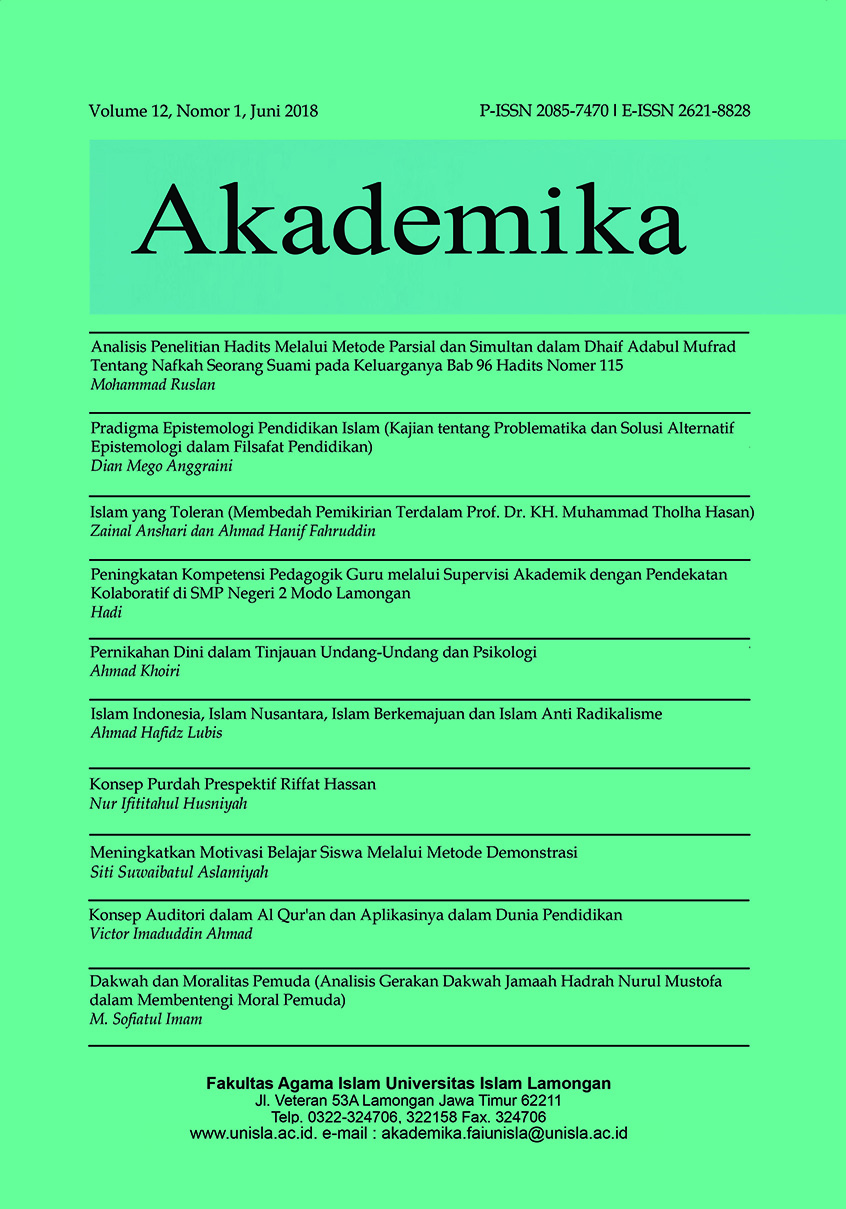KONSEP PURDAH PRESPEKTIF RIFFAT HASSAN
DOI:
https://doi.org/10.30736/adk.v12i01.148Abstract
Abstract: Purdah has become a Muslim institution for a thousand years. Purdah is an integral part of medieval Muslim society and culture. The concept of purdah stems from the system of dividing two regions in Islamic society, namely the private area (home) and the public area (workplace). Women are in a private area while men are in public areas. According to the general assumption of Islamic society, as long as women are in the public area, women must wear a veil or purdah. Based on the general concept, according to Riffat Hassan about the concept that women do not have to cover their faces with a veil when they leave home. Riffat interprets the hijab (including headscarves or purdah) does not meant to have clothes that cover the entire body of a woman including her face and palms, but clothes that are according to socially properness.
Keywords: Purdah, Riffat Hassan.Downloads
References
Abdul Mustaqim, Tafsir Feminis versus Tafsir Patriaki (Yogyakarta:Sabda Persada,2003)
Djamaludin Ancok, Psikolgi Islam :Solusi Islam atas Problem-Problem Psikologi (Yogyakarta: Pustaka Pelajar,1994)
Ghazali Anwar, Wacana Teologi Feminis Muslim dalam Zakiuddin Baidhawy, WacanaTeologi Feminis (Yogyakarta:Pustaka Belajar,1997)
Fatima Mernissi, Beyon the Veil; Male-Female Dynamics in Modern Muslim World, M.Abadi penerj.(Surabaya:Al-Fikr 1997)
Fatimah Mernissi,Riffat Hassan, Setara di Hadapan Allah: Relasi Laki-laki dan Perempuan dalam Tradisi Patriaki (Yogyakarta:LSPAA Yayasan Prakarsa,1995),
Mazhar ul-Haq, Wanita Korban Patologi Sosial (Jakarta: Pustaka,1994)
Riffat Hassan, Women Living Under Muslim Law, sebuah kumpulan artikel Riffat Hassan, diambil dari The Committee on South Asian Women’s Buleetin vol.IV,1986
Riffat Hassan, “Jihad fi Sabilillah: A.Muslim Women’s faith Journey from Struggle to Strugle†dalam Women’s and Men’s Liberation (USA:Greenwood Press,1993)
Riffat Hassan, Women Religion and Sexuality : Study of Impact of Religious Teaching on Women ( Philadelpia : Trinity Press)
Riffat Hassan,Teologi Perempuan Dalam Tradisi Islam:Sejajar di hadapan Allah, dalam Ulumul Qur’an No IV,Vol.I , 1990
Riffat Hassan, Feminisme dan Al-Qur’an,
Riffat Hassan, Women’s Right and Islam (From the ICPD to Beijing) dalam Women’s and Men’s Liberation
Muhammad Ali As-Shabuni, Rawai’u al-bayan Tafsir Ayati al-Ahkam min Al-Qur’an, jilid II (Beirut :Dar Al-Fikr)
Muhammad Iqbal, The Resconstruction Of Religious Thought In Islam (Lahore: Syekh Muhammad Ashraf,1962)
Muhammad Syahrur, Al-Qur’an Wal Kitab Qira’ah Mu’ashirah (Damaskus:Al-Ahli at-Thiba’ah wa al-Nashr,1993)














